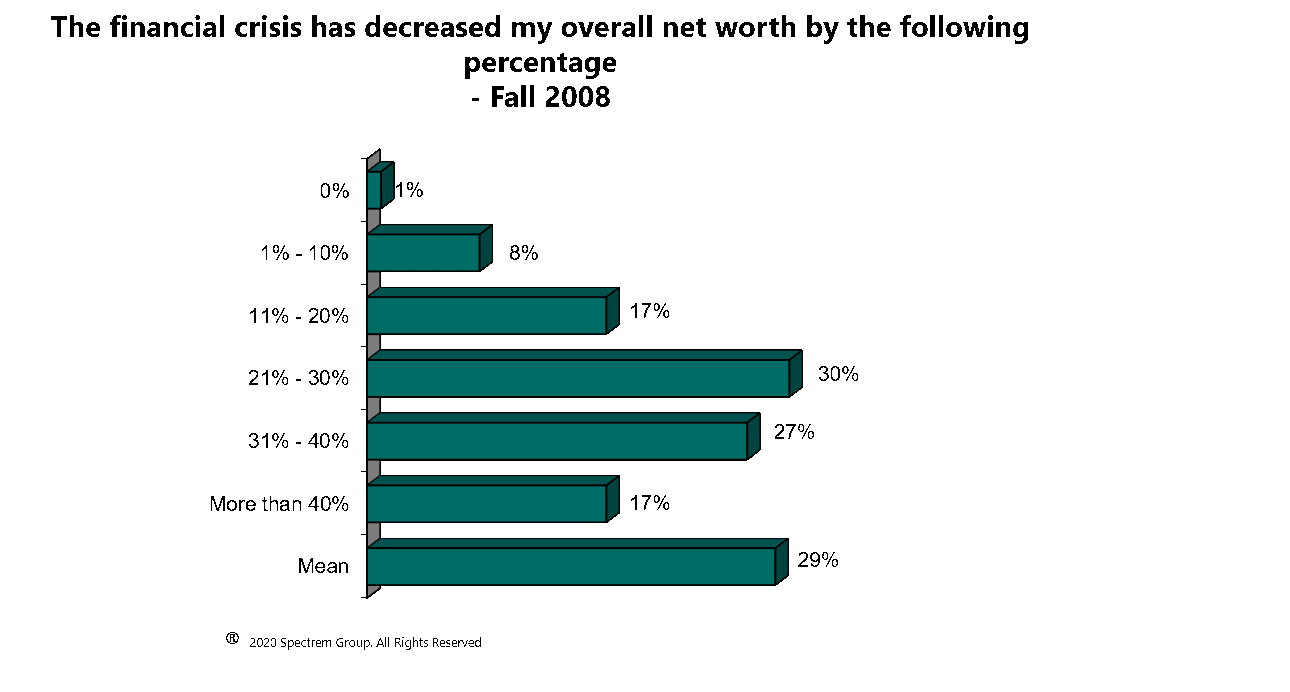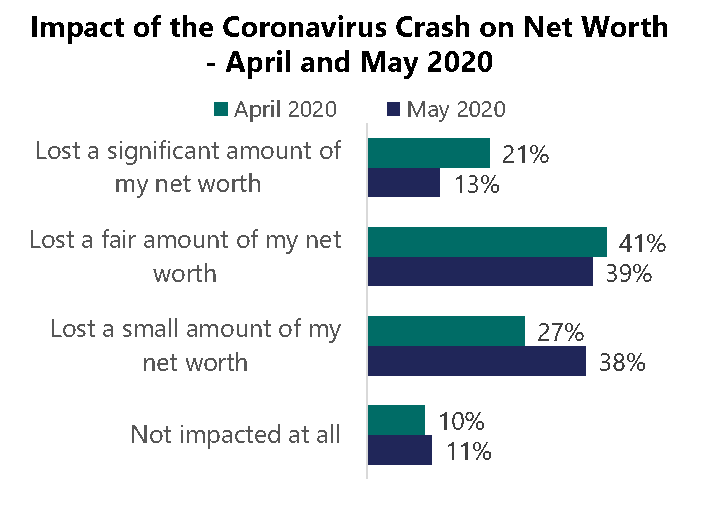Written by: George Walper, Jr.
For many investors, 2008 was the biggest financial impact they had suffered until that time. Investors were angry and afraid and it took several years before they began to rely upon their financial advisors once again. Then, only 12 years later, the economic shutdown of 2020, caused by the pandemic again rocked the portfolios of investors. But the results of the 2020 crash have been very different than the one experienced in 2008. In fact, the lessons investors learned from the 2008 market collapse may have softened the blow for many in 2020. (For more information regarding our ongoing research please check out our monthly journal, High Net Worth Insights). Spectrem Group’s research tracked the outcomes of both market crashes and has found some interesting comparisons.
How similar were these crashes in the opinion of investors? In late 2008 investors were asked about the impact of the financial crisis on their overall net worth. As you can see below, in research conducted in 2009, most investors indicated they lost about 29% of their net worth with 17% losing more than 40%. In 2020 the question was asked somewhat differently with similar results. Investors were asked what percentage of their net worth was lost as of April 2020 and May 2020. The largest percentage (41%) indicated they had lost a fair amount of their net worth as of April, with 21% indicating they had lost a significant amount of their net worth. By May 2020 those percentages were improving with fewer investors saying they had lost a significant amount of their net worth and more investors feeling they had lost only a small amount of their net worth.


Attitudes of investors in 2008 and 2020 were similar. As of May 2020, 71% of investors felt that the U.S. would be going into a Recession. In 2008, 31% of investors felt that the U.S. economy would recover within one year while almost half (47%) felt the economy would recover within 13-24 months. Depending upon what indicator is chosen, the economy took much longer to recover from the 2008 Recession than two years. In 2020, 30% of investors believe that the economy will recover within one year while 34% anticipate a one to two-year recovery, and 36% anticipate the recovery will be two years or more.
But what is different about 2020 when compared to 2008?
Risk tolerance is one of the interesting differences between 2008 and 2020. In 2009, shortly after the 2008 crash, 14% of investors described themselves as Most Aggressive/Aggressive, 58% of investors defined themselves as Moderate, and 28% were Conservative. In contrast, as of July 2020, 30% of investors described their risk tolerance as Most Aggressive/Aggressive, even higher than in January of 2020 when markets were booming. As of July 2020, however, 21% of investors did describe their risk tolerance as Conservative, compared to only 17% in January 2020.
The more aggressive risk tolerance in 2020 may be due to the fact that markets rebounded more quickly in 2020 than in the 2008 Recession. It may also be due to the difference in the underlying cause of the market collapse. The pandemic shutdown was a specific event leaving investors to believe that the underlying economy was still strong. (Although that attitude may change as economic uncertainty continues.) In fact, 18 percent of investors in March 2020 and 23 percent of investors in April 2020 found the market crash provided a buying opportunity.
Finally, some of the lessons learned in 2008 may have impacted the portfolios of investors in 2020 resulting in fewer losses due to higher levels of cash investments at the outset. The initial implications on the portfolios of wealthy investors in 2020 were similar to 2008 although investors started at higher levels and began to recover more quickly. In making this analysis, Spectrem relied upon its data for Millionaire households (those with $100,000 of net worth, not including the value of the primary residence.) In general, the Investable Assets of a Millionaire household represent about 56% of an investor’s total portfolio. It’s interesting to note that the amount of Deposits held in a Millionaire’s account in 2008 was much lower than in 2020. As of July, Millionaires held about 15% of their total investable assets in cash. In fact, in 2008 investors were more likely to be invested in Stocks and Bonds than in 2020. Due to the higher levels of cash in investor portfolios in 2020, overall losses may have been lower and the ability to recover may have been easier.
Because the 2020 market crash occurred only 12 years later than the 2008 Recession, investors were still somewhat wary regarding their portfolios. They were more likely to hold greater percentages of assets in cash. More importantly, 2020 investors were able to respond to a recovery that seems to be occurring more quickly than in 2008.
Related: Do Politics Impact Referrals?

